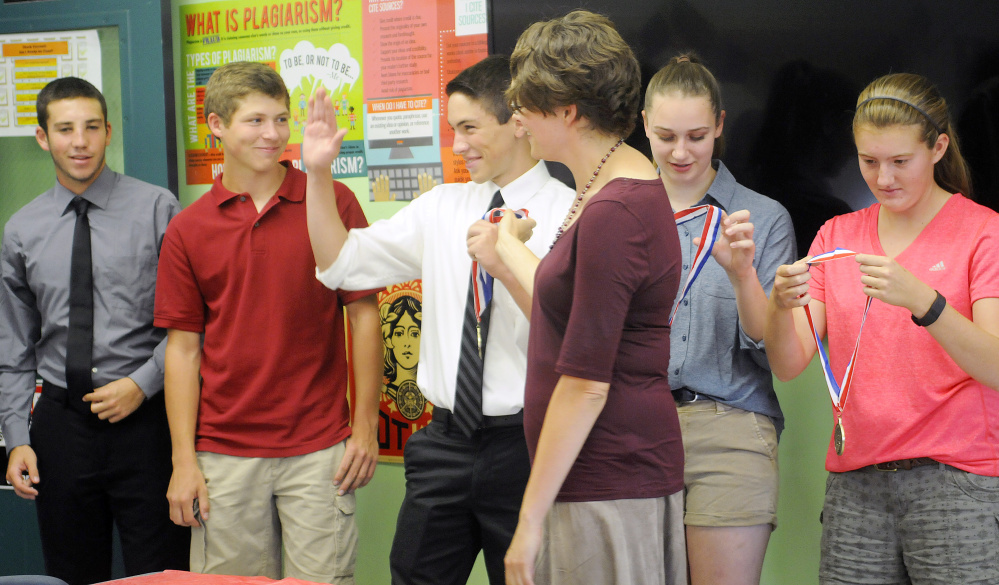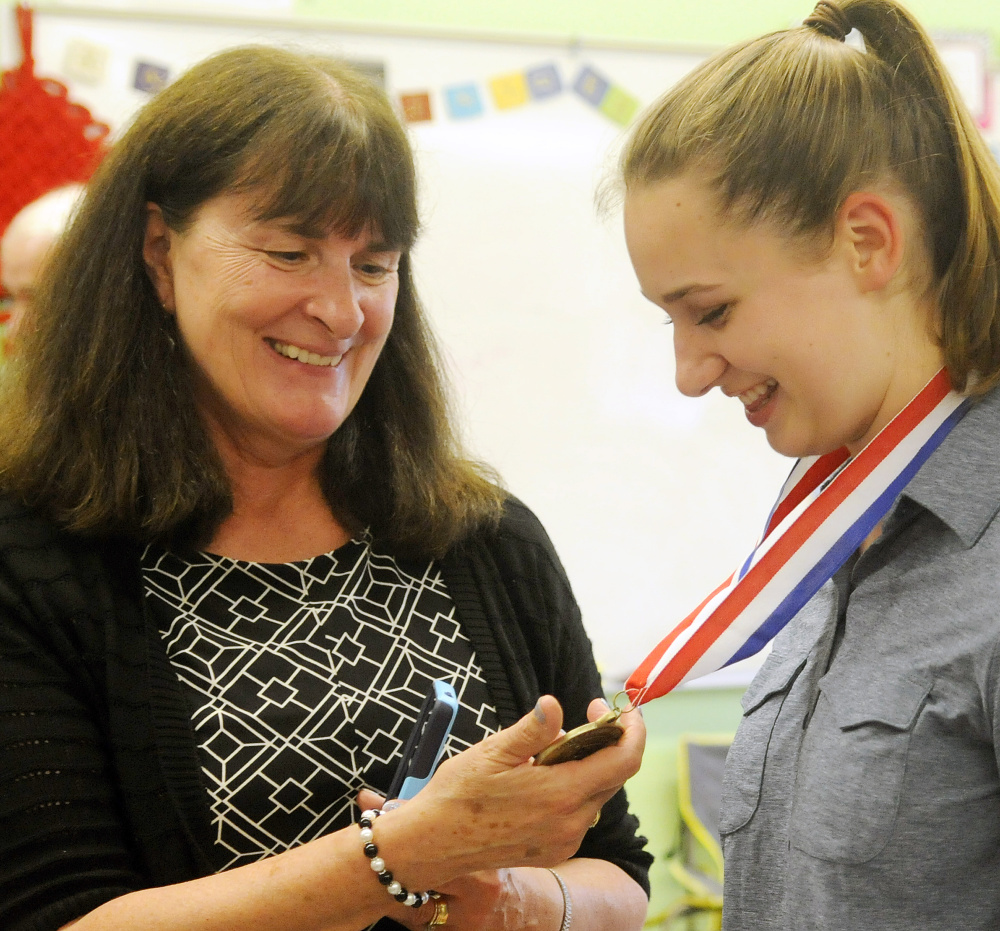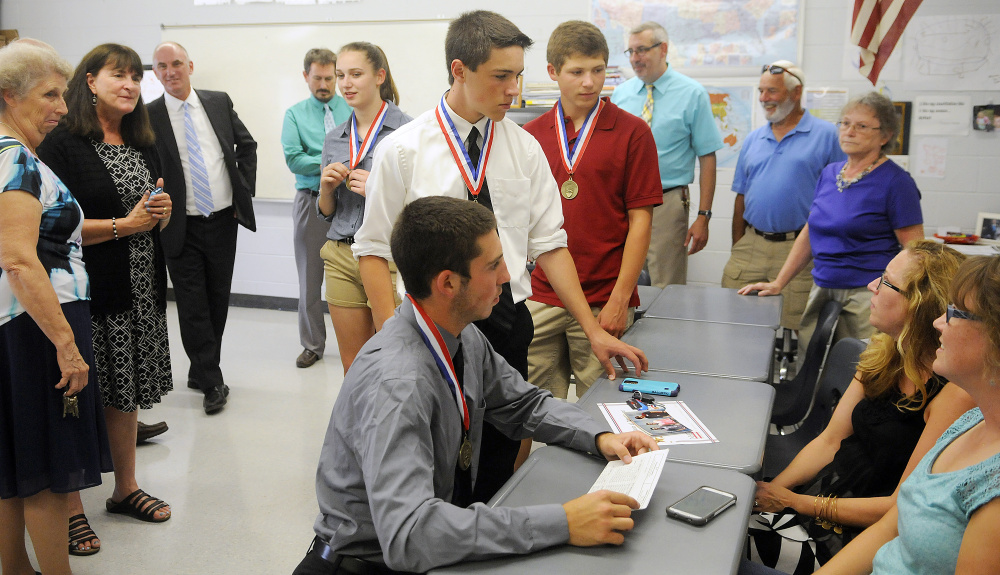MONMOUTH — Cody Roy said he first heard about the Acadian deportation of the 1700s in seventh grade, from a substitute French teacher of Acadian descent. Four years later, he and four classmates created a 10-minute documentary on the subject that received an award during a national history contest.
The documentary by Roy, Maddie Amero, Abbey Allen, Devon Poisson and Dylan Goff was chosen as the best presentation from Maine by the National Park Service during the National History Day contest in June at the University of Maryland. Monmouth Academy history teacher Jocelyn Gray presented the quintet with medals during a short ceremony Thursday afternoon in front of parents, grandparents and officials from Regional School Unit 2.
“It’s an incredible achievement and we’re so proud of them,” said Superintendent Bill Zima. “I would love to say I know (a lot about the Acadian deportation), but I’m dying to know more.”
The British forcibly removed the Acadian people from Nova Scotia, New Brunswick and Prince Edward Island, known in the 17th century as the French colony of Acadia.
According to the Canadian-American Center at the University of Maine, the expulsion lasted from 1755 until 1778. More than 10,000 Acadians were deported from their homes in Nova Scotia. Descendants of displaced Acadians who settled in Louisiana are known as Cajuns.
For the Monmouth Academy students, the history project proved to be “an awesome achievement” because the students worked on the project on their own time in addition to a full class schedule, Gray said.
“Their work ethic is amazing,” she said. “They realized the Acadians were so passionate about their history and they wanted to represent how important this heritage is to them.”
The students did extensive research in creating the documentary, including reviewing archival documents at the Maine State Museum, speaking with people from the Acadian Museum in Erath, Louisiana, and exploring the Acadian influence in the Washington County city of Calais.
Roy said his seventh grade substitute teacher went out of her way to teach the students about the subject because it was clearly important to her and her family’s history.
“It’s not something they normally teach you in school,” Roy said. “A few of us knew a little bit about it, and we wanted to think of something relative to this area” for their project.
One of the most famous writings of American poet and Portland native Henry Wadsworth Longfellow is “Evangeline, A Tale of Acadie,” about an Acadian girl searching for her long-lost love during the expulsion.
Roy said comments by Republican presidential nominee Donald Trump about the deportation of illegal immigrants resembles what happened to the Acadians more than 250 years ago.
“It’s a pretty similar thing but on a more massive scale,” Roy said. “It puts it into perspective, because we read a lot about specific families that were split,” which could happen under Trump’s plan.
The Monmouth Academy group placed second in April’s state competition, allowing it to move on to the national competition in Maryland. A group from Morse High School in Bath was the first-place Maine winner for a project called “Africa: The Explorations of David Livingstone.”
Three of the Monmouth students spent a week in the nation’s capital visiting local sites and participating in the competition while staying in dormitories on the Maryland campus in College Park.
“We got to do a lot of things and see a lot of landmarks,” Roy said. “The competition was definitely the highlight.”
The same students already are thinking about their documentary project for the 2017 competition, and have told Gray they plan to begin working in October instead of January.
The theme for this year is “Taking a Stand in History.” The students have chosen to create a documentary on the Milan Conference in 1880, which banned the use of sign language in schools across the United States and Europe.
“To be honest, none of us know anything about it, which is one of the reasons why we picked it,” Goff said. “There isn’t much of a challenge in doing a project about something you already know.”
Goff said they plan to incorporate sign language into their documentary.
“When you have something that you haven’t learned about at all and that the general public doesn’t know a lot about, it’s all that more interesting to do and the project can be that much more creative,” he said.
National History Day started as a local competition in 1974 in Cleveland, Ohio, with 129 student participants. Last year more than 600,000 students and about 30,000 teachers took part and were awarded more than $150,000 in prizes and scholarships.
Jason Pafundi can be contacted at 621-5663 or at:
jpafundi@centralmaine.com
Twitter: jasonpafundiKJ
Copy the Story LinkSend questions/comments to the editors.





Success. Please wait for the page to reload. If the page does not reload within 5 seconds, please refresh the page.
Enter your email and password to access comments.
Hi, to comment on stories you must . This profile is in addition to your subscription and website login.
Already have a commenting profile? .
Invalid username/password.
Please check your email to confirm and complete your registration.
Only subscribers are eligible to post comments. Please subscribe or login first for digital access. Here’s why.
Use the form below to reset your password. When you've submitted your account email, we will send an email with a reset code.